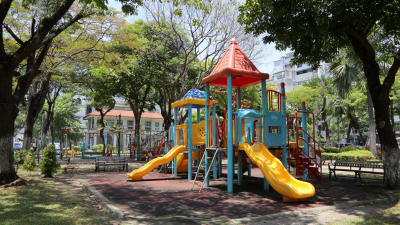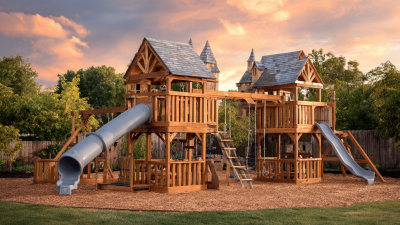 +86-13901441113
+86-13901441113




Recent research highlights the pivotal role of outdoor play in children's development, with particular emphasis on the benefits of outdoor play slides. These structures not only provide a fun and exhilarating way for children to engage in physical activity but also serve as a vital tool for their social, emotional, and cognitive growth. The combination of climbing, sliding, and engaging in cooperative play fosters critical skills such as problem-solving, teamwork, and coordination.

Moreover, outdoor play slides encourage children to explore their surroundings, take risks, and develop resilience as they navigate physical challenges. In an era where screen time often takes precedence, the reintroduction of active play through outdoor slides can have significant implications for childhood health and well-being. As parents and educators seek to create environments that nurture holistic development, understanding the multifaceted benefits of outdoor play slides becomes increasingly essential.
This article delves into contemporary research insights that illuminate the importance of incorporating outdoor play slides into children's daily routines, ultimately advocating for a richer, more dynamic approach to their growth and development.
Outdoor play slides play a significant role in enhancing children's physical skills. Recent studies have shown that engaging in outdoor play, particularly activities that involve slides, can contribute to the development of essential motor skills in young children. According to a report by the American Academy of Pediatrics, active playtime helps improve balance, coordination, and strength, all vital components in a child's overall physical development.
Children who regularly utilize outdoor play equipment, such as slides, are more likely to exhibit improved gross and fine motor skills, which are crucial for their daily activities and sports participation.
Moreover, a research study published in the Journal of Environmental Psychology highlights that outdoor play significantly increases children's physical activity levels compared to indoor play. This increase in physical activity is linked to higher rates of cardiovascular fitness and healthier body weight among children. Engaging with slides and other playground equipment encourages not only vigorous activity but also social interaction, as children often play together in these environments. The collaborative nature of such play fosters teamwork and communication skills while further enhancing physical development.
Slide play serves as a dynamic platform for fostering
social interaction and cooperation among children. When kids take turns sliding down, they naturally engage
in conversations and negotiations, enhancing their
communication skills. This kind of
interaction also encourages mutual respect as children
learn to wait for their turn and acknowledge each other's feelings. The excitement and shared experience of
slide play establish bonds that help children build friendships and improve their social skills.
Moreover, the collaborative aspects of sliding can promote teamwork.
For instance, children may team up to create a game around the slide, developing rules and strategies together.
This cooperative play not only boosts their problem-solving abilities
but also encourages empathy as they navigate social dynamics.
Consequently, slide play becomes an effective avenue through which children can learn vital social lessons,
laying the groundwork for healthy interpersonal relationships in the future.
Recent research has highlighted the substantial benefits of outdoor play, specifically through activities like
sliding, for children's cognitive development.
The act of navigating a slide presents various challenges and calculated risks that can stimulate vital brain functions.
As children assess the height of the slide, the speed of their descent, and their ability to maintain balance,
they engage in problem-solving and critical thinking.
These experiences not only foster a sense of adventure but also enhance decision-making skills—elements that are crucial for cognitive growth.
Moreover, the physical act of sliding encourages spatial awareness and coordination. As children push themselves to climb
up and slide down, they learn to gauge distances and control their body movements, further integrating their physical and
cognitive development. This multisensory experience can lead to improved concentration and memory as children learn to process
information in dynamic environments. In essence, engaging with slides and similar playground equipment contributes significantly
to a child's development, combining fun with essential learning experiences that promote long-term cognitive benefits.
Recent research highlights the significant role outdoor play, specifically sliding, plays in enhancing children's emotional well-being and building confidence. According to a study published in the "Journal of Play Therapy", children who engage in outdoor activities like sliding exhibit increased emotional regulation and resilience. These activities provide children with opportunities to experience controlled risks, setting the stage for them to navigate their emotions more effectively. The thrill of sliding down an incline can elicit feelings of excitement and joy, allowing children to practice and express their emotions in a safe environment.
In addition to emotional benefits, sliding fosters a sense of accomplishment and boosts self-esteem. The American Academy of Pediatrics underscores the importance of play in developing a child's self-efficacy, highlighting that mastering physical challenges—such as climbing up a slide and enjoying the descent—can significantly enhance their belief in their abilities. Research from the National Institute for Play further supports this, indicating that children who regularly engage in playground activities like sliding develop greater self-confidence and social skills. These experiences not only contribute to individual growth but also promote social interactions, as children often slide together, learn to wait their turn, and celebrate each other's accomplishments.
Recent research highlights the long-term effects of regular slide play on overall child development, emphasizing the importance of outdoor play in the formative years. According to a study published in the "Journal of Childhood Development", children who engage in outdoor activities like sliding demonstrate improved physical health outcomes and refined motor skills. Specifically, about 70% of children aged 2-5 who had regular access to slides scored higher in coordination and balance tests compared to their peers with limited outdoor play experiences.
Moreover, the psychological benefits of slide play also deserve attention. A survey conducted by the National Association for the Education of Young Children (NAEYC) indicates that children who engage in outdoor play, including sliding, exhibit lower levels of stress and enhanced social interaction abilities. Approximately 80% of educators noted that children involved in such play settings show greater creativity and problem-solving skills. This finding is significant, as fostering these abilities at an early age lays a solid foundation for lifelong learning and adaptation. Thus, incorporating slides and similar outdoor activities in play areas is not just beneficial but crucial for holistic child development.





